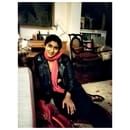What makes Her Campus UCT so special and unique from the other chapters is that our members, writers, and students are incredibly diverse. Each person has something beautiful and interesting about them – a story to share, a talent, or an outlook on life. We’d like to celebrate our diversity by zooming in on individual’s stories, speaking to them about what they’re most passionate about and letting them shine on our platform. Whether it be just for a chuckle or to actually share some wise words, we’d like to introduce a new series to Her Campus UCT: Humxns of UCT.
I first met writer and anthropologist Kharnita Mohamed when I went to her for curriculum advice. I came from my session with her, in complete awe of her divergent path in academia (she went to university later in life) and how both her book and academic research she gives voice to the too often misrepresented identities of the disabled and brown Muslim femmes. In my session, I felt listened to and validated. I was given the space to be vulnerable and share my complicated relationship with being a young Muslim femme. Kharnita gave me advice perfumed with sincerity and relatability, guided by desire for the academy to speak to the needs of the humxns who contribute to them. She left me with a signed copy of her book “Called to Song “and a note reading “I hope all the words and worlds you dream of find you “. I chose to profile her for Humxns of UCT, because everyone needs to know about one of the coolest lecturer at UCT and the work that she does to make our campus and the world a more inclusive space for marginalized identities. In our interview we talk about her winding path in academia, her book & what feminism means to her.
Image from Tanweer Maryam
How did find yourself in academia?
I came into academia very late. I dropped out of school at a very young age. I worked and owned a store in Green Market Square. Like most occupations it became stale after a while. So, I returned and got my matric. My family had been encouraging me to go to university for a while, so at 29 I went to do my undergrad in Anthropology at UWC. When I got there, it was amazing. This thing (university) which had taken me years and multiple failures before I reached it, was where I thrived. I graduated summa cum laude and won a scholarship to complete my Masters at the University of Chicago.
What drove you to study and become an anthropologist?
Feminism was an obvious motivation behind studying anthropology. You kind of know how patriarchy shapes your world and produces limitations within the world intersected with race and class etc, but feminism gave me a language to cultivate a political connection to thinking about how the work of thinking opens up different ways of being. Anthropology also gives you an openness as to how to ask questions. It gives you an attentiveness to how people actually live. One of the things I learned going to university older, a lot of the stuff we read didn’t make sense. I rarely had the sense that the literature was right and I was wrong. I think when you’re younger, you attempt to collapse the world into what they’re reading, rather than question the literature. There was a possibility to that in anthropology despite its horrifying history. It requires you to actually engage with people and ask questions, instead of assuming you have the answers (which was tricky for me as a shy person).
What are your areas of interest?
My main area of interest is disability. I am interested in how the bodies in our texts presume particular kinds of people and bodies. Falling ill while I was doing my masters and not being able to get by when previously I had thrived academically has shaped this my work. I witness how institutions continue to run on their own agenda, despite the experiences of the individuals who contribute to them. My love affair with academia shifted as I realized that institutions do not work on human scale or appeal to what people are actually going through.
Image from Tanweer Maryam
What is your novel about?
The story is about a womxn who has a sense of alienation. She is a middle-class black professional in a post-apartheid context. She is lecturer and presumably has a lot of status and privilege relative to her orthodox Muslim family who is still living in the Cape Flats. She has been married for a very long time. Their relationship is a very strange and barren one. We meet her when her mom dies. This acts as a catalyst for her to rethink her life. For years she has suspected that her husband has betrayed her and she goes to find out. The story follows her as she takes charge of her life and begins to connect with the parts of herself that she had previously denied. In the book I wanted to think about internalized racism and how it manifests in our lives and intimate relationships.
What inspired the novel?
I wrote the book in the wake of my mother’s death. Although the novel is not autobiographical, the lead character’s mother dying, acts as a catalyst for the novel’s events. I had gone to an anthropology conference where one of the presentations made me really angry. The manner in which the represented the sense of this community (Cape Malay Muslims) was so violent. They were asking people to laugh at the community. I realized I had to do something with my anger. We need to be telling our own stories and the only way you engage with shaping representation, is by shaping representation. Somewhere in that the novel emerged.
How do you balance giving voice to women who are silenced by their communities without stereotyping said communities?
I try to show that in the book by displaying multiple experiences of Muslim femininity. One of the animating questions was how do you write in a moment of anti- Muslim prejudice? There has been a normalization of anti- Muslim prejudice within popular culture within the last 20 years. How do you write that has a relatability to the way in which hierarchization of gender and sexuality has been normalized within Muslim households? This normalization has produced households where womxn are living in terror. The womxn in this book are products of violent home environment, but I present different approaches or responses to that violence. I wanted to represent not just one type of Muslim womxn, but also not just one type of Muslim man. I wanted to have tenderness and generosity Muslim masculinity and see how they are products of history.
Image from Tanweer Maryam
What does feminism mean to you?
My notion of feminism is a world in which everyone gets to thrive and your thriving isn’t dependent on you having your boot on anybody’s neck. It’s not about the reversal of gender regime, where womxn or black people are in ascendance. It’s about a world in which equality is a prospect and every person have what they require to thrive. A notion of freedom that is tied to a sense of justice. Coloniality shaped our reality and history was/has used hierarchy and the idea that some people are better than others to shape our reality. I want a world where its profoundly abnormal to have that kind of logic.


